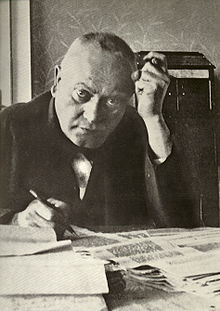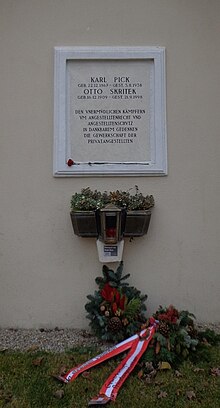Karl Pick
Karl Pick (born December 21, 1867 in Petschek , Bohemia , † August 3, 1938 in Vienna ) was an Austrian social democratic trade unionist and politician.
Life
Karl Pick was a Jew. He was the son of a butcher in the town of Pečky in Bohemia ( Poděbrady district ), who enabled the son to attend high school in Prague . In his youth, Pick sympathized with the political grouping of the nationalist young Czechs . He belonged to a delegation of the Young Czechs in 1884 at the funeral of Bedřich Smetana .
In 1892 Pick came to Vienna, where he found a job as an accountant and joined the Social Democrats . In the same year he took part in the inaugural meeting of the Association of Commercial Employees , one of the first trade union associations for commercial employees in Vienna. As early as 1895, Pick became the chairman of this association, which had been a member of the social democratic union commission since 1893. The skillful agitator and speaker succeeded in leading the association from its humble beginnings to ever increasing membership numbers. In 1898 he and his free trade union faction had already overtaken the united Christian-social and national list Axmann in the elections to the assistant committee of the Viennese merchants (the legal professional representation of the trade employees), but this was done by the Viennese magistrate, which was under Christian-social rule, under the The pretext of electoral fraud was not recognized. Only a renewed victory of the Pick list in 1902 had to be confirmed by the magistrate under pressure from the imperial governor's superior. Pick was now chairman of the assistant committee of the committee of the Viennese merchants and the health insurance of the Viennese employees. In this function, he campaigned for a merger of the various trade union associations of the monarchy, which became a reality in 1904 with the establishment of the Central Association of Austrian Commercial Employees . Karl Pick became the chairman of the Central Association and remained so until it was banned in 1934.
After the end of the First World War, Karl Pick was initially a city councilor in Vienna, from 1919 to 1934 he was a member of the Austrian National Council. From 1921 to 1926, Pick was vice-president of the Vienna Chamber of Labor , member of the board of directors of the Federation of Free Trade Unionists and member of the board of the International Federation of Private Employees . As chairman of the Gremialkrankenkasse he was responsible for the establishment of some health facilities, such as the sanatorium of the Viennese merchants' union (1909), the Gersthof women's clinic and lung sanatorium in Gröbming and Weyer . In addition, he has always worked as an editor for the Austrian employee newspaper .
After the events of February 1934 , the Central Association of Commercial Employees was closed and Karl Pick was arrested and imprisoned for 6 weeks. Parliament was shut down. Since then, Pick has not made any political appearances. He was old and sick and increasingly lost the will to live. When he fell and broke his hip in 1938, after the National Socialists came to power, he no longer wanted to live. He came to the commercial hospital, which he had once co-founded, and died there two weeks later. Since he was Jewish, he could not lie in the hospital room, only in the corridor.
Karl Pick was buried in the urn grove of the Simmering fire hall . After the war, a plaque of honor was dedicated to him there by the private employees' union. His grave is one of the honorary dedicated or honorary custody grave sites of the City of Vienna.
In 1962, the Karl Pick Medal for services to trade employees was donated by the Trade Section of the Private Employees' Union. A residential complex built 1963–65 at Hollandstrasse 1 in Vienna- Leopoldstadt was named Karl-Pick-Hof and has a plaque with a portrait relief. In 1993 the Pickgasse in Vienna- Favoriten was named after him.
meaning
Karl Pick was the most important figure in the employee union movement in its early days. He tried to convince the employees that successful organization could only be achieved with the workers. His achievements and successes included the enforcement of the work-free Sunday, the restriction of shop opening hours to 7 p.m. and later 6 p.m., the 48-hour week and the expansion of health care. The Salaried Employees Act passed in the First Republic is based on its foundations.
literature
- Franz Nekula-Berton: Karl Pick. From his life, from his work . Publishing house of the Austrian Federation of Trade Unions, Vienna 1967.
- Felix Czeike : Historical Lexicon Vienna . Volume 4: Le - Ro . Verlag Kremayr & Scheriau, Vienna 1995, ISBN 3-218-00546-9 .
- Ernst Lakenbacher : Pick Karl. In: Austrian Biographical Lexicon 1815–1950 (ÖBL). Volume 8, Verlag der Österreichischen Akademie der Wissenschaften, Vienna 1983, ISBN 3-7001-0187-2 , p. 61 f. (Direct links on p. 61 , p. 62 ).
Web links
- Karl Pick on the website of the Austrian Parliament
- Karl Pick. In: dasrotewien.at - Web dictionary of the Viennese social democracy. SPÖ Vienna (Ed.)
Individual evidence
- ↑ www.friedhoefewien.at - Graves dedicated to honor in the fire hall Simmering cemetery (PDF 2016), accessed on March 7, 2018
| personal data | |
|---|---|
| SURNAME | Pick, Karl |
| BRIEF DESCRIPTION | Austrian trade unionist and politician, member of the state parliament, member of the National Council |
| DATE OF BIRTH | December 21, 1867 |
| PLACE OF BIRTH | Petschek , Bohemia |
| DATE OF DEATH | August 3, 1938 |
| Place of death | Vienna |


